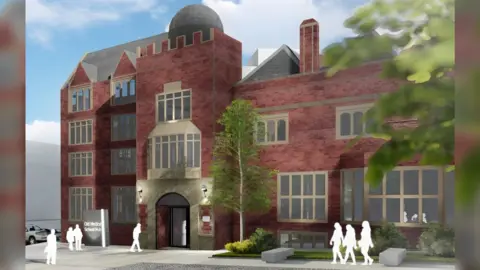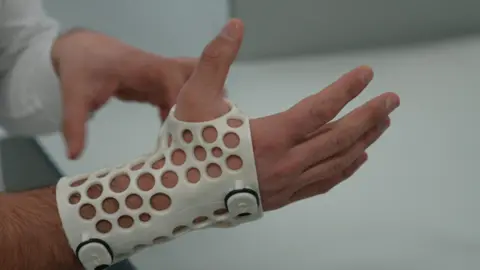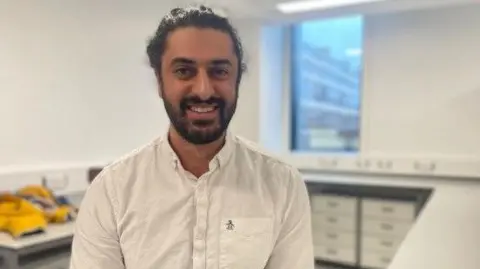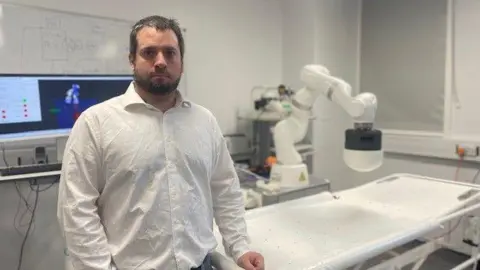BBC Yorkshire, Political Reporter
 Leeds Leads Hospitals NHS Trust
Leeds Leads Hospitals NHS TrustWorking in a new “innovation village” associated with Leeds General Infirmary is decided to continue, despite a million pounds to rebuild the hospital that is delayed by 2030.
Linking the two universities in the city to the hospital, medical beginnings in the city say the proposed center is “essential” for the development of new technology.
When Guarav Chauhan was involved in a serious car collision, he spent more than a year wearing moments and pieces of neck, arms and knees.
Like many he was destroyed by discomfort, itching and aroma as a result of narrow plaster.
But working with Ali Abdi’s engineering graduate, he used his experiences and knowledge of 3D printing to find a solution.
Together they developed a light, waterproof crack with the help of Nexus Leeds, the University of Leeds Cooperation and Innovation Center, and Cast3D started.

Mr. Abdi said access to Nexus had given them the opportunity to cooperate with academics and hospitals.
He said: “These collaborations and presentations really allowed us to make clinical developments to reach the point where we are now doing clinical rehearsals.
He said that having a space in the city for technology to “develop, tested and presented” it was “very important” and that the development of the village of innovation would “mean the success of some of these technologies”.

Since starting in 2019, Nexus has worked with 191 companies and said that over half of its member businesses were innovators of health technology.
Little Journey is an app that helps prepare children for hospital treatment and is now used in about 100 hospitals worldwide.
It was founded in 2018 by anesthetist Dr Chris Evans and Sophie Copley to help children and their families overcome their fear.
Ms Copley said the support they received through Nexus was vital.
“Only two people can’t make it happen [but we] Received funding support and were able to develop the product through a healthcare system, ”she said,

Bruno Scaglioni’s team has also benefited from being part of the Nexus Health Innovation Center.
Atlas endoscopy is working to improve access to colonoscopy through specialized robotic technology using magnetic.
The company has scared the technique in America and hopes to make a wider judgment in the UK this year.
He said that being part of a center like the one in Leeds had been “essential because we are near the university, we are near the hospital, we are in a place an ecosystem that attracts talent”.
“For high -tech companies like us, the team and the people who are part of the company are really the greatest asset you can have as a company,” he said.
“There is no way to attract talent unless you have an eco-system around you.”
According to the hospital plans, the new village of innovation would be built in five hectares between Calverley Street and Woothouse Square and centered around the old medical school.
Prof Phil Wood, chief executive of Leeds Hospitals, said it was estimated that the development would create 4,000 jobs and provide a 13 billion boom in West Yorkshire economy.
Had been afraid that the proposal would be sheltered after The government said LGI redevelopment would not begin before 2032.
But Prof Wood said leaders in the city were drawn together to ensure that the innovation circle continued.
“Plan A was that this would be part of the back of the hospital, but, in recent weeks, we have joined to see how we continue the innovation circle,” he said.
James Lewis, leader of the Leeds City Council, said the authority was “absolutely committed” to “stimulating innovation and economic growth”, adding that the village of innovation would further “strengthen the position of Leeds as a global center of health technology”.
However, Alec Shelbrooke, conservative MP for Weatherby and Esingwold, told the BBC that he had “Zero confidence” that work would happen as “nothing is being built”.
It is hoped that the redevelopment of the old medical school will begin by the end of the year, with developers Scarborough Group International in the hope that they will be able to complete work by mid -2027.
Listen to the main points from West Yorkshire in BBC soundslast Episode of North Look Or tell us a story you think We need to cover here.
